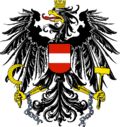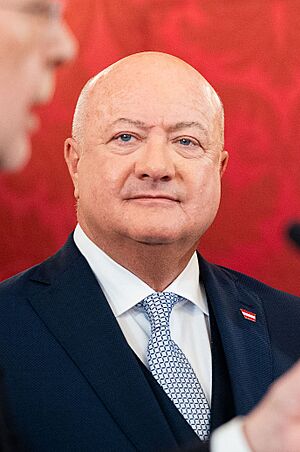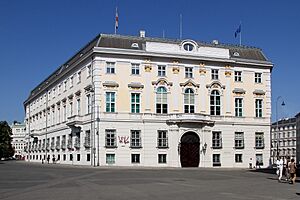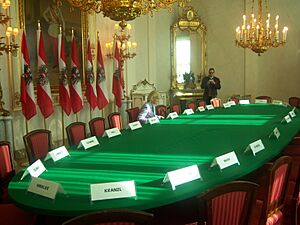Chancellor of Austria facts for kids
Quick facts for kids Federal Chancellor of Republic of Austria |
|
|---|---|

|
|

|
|
| Chancellery | |
| Style | Mr Chancellor His Excellency (diplomatic) |
| Member of | Cabinet European Council National Security Council |
| Seat | Chancellery Building Ballhausplatz, Innere Stadt, Vienna |
| Appointer | President |
| Term length | No fixed term |
| Constituting instrument | Constitution of Austria |
| Precursor | Minister-President of Cisleithania |
| Formation | 30 October 1918 |
| First holder | Karl Renner |
| Deputy | Vice-Chancellor |
| Salary | €306,446 annually |
The Chancellor of Austria is the leader of the Austrian government. This important role is officially called the Federal Chancellor of the Republic of Austria (German: Bundeskanzler der Republik Österreich).
Many people have held this position. So far, twenty-nine different people have served as Chancellor. The person currently holding this office is Christian Stocker. He became Chancellor on March 3, 2025.
Contents
The Chancellor's Role in Austria's Government
The Chancellor of Austria leads the country's main decision-making group, called the Cabinet. This group includes the Chancellor, the Vice-Chancellor, and other ministers.
Together with the President, who is the country's head of state, the Cabinet forms the top part of the government's executive branch. The executive branch is responsible for carrying out laws and managing the country.
How Power Works in Austria
Austria is a parliamentary republic. This means that the head of government, the Chancellor, holds most of the real power. However, in Austria, the President also has a big role. Many major government actions need the President's approval or signature. This means the Chancellor often needs the President's agreement for important decisions.
Ministers and the Vice-Chancellor do not report directly to the Chancellor. They work together as a team in the Cabinet.
The Chancellor's Power in Parliament
The Chancellor's power in making laws depends on how many members their political party has in the National Council. This is Austria's main parliament.
If different parties form a coalition cabinet (a government made of two or more parties), the Chancellor is usually the leader of the party with the most seats. The leader of the other main party in the coalition often becomes the Vice-Chancellor.
A Brief History of the Top Leader
The first leader of an independent Austrian government was called the State Chancellor of the Austrian Empire. Only one person, Klemens von Metternich, held this title. Later, the position was renamed to Minister-President. This continued until the end of Austria-Hungary after World War I.
After the monarchy ended, Karl Renner became the State Chancellor of German-Austria. When a union between Austria and Germany was not allowed, the title changed to State Chancellor of Austria. Finally, it became Federal Chancellor, which is the title used today.
The official office and home for the Chancellor is the Chancellery. It is located at Ballhausplatz in the center of Vienna. Both the Chancellor and the Cabinet members are chosen by the President. The President can also remove them from their positions.
The current Chancellor is Christian Stocker. He was sworn into office on March 3, 2025, by President Alexander Van der Bellen.
History of the Chancellor Title
The word "Chancellor" (Kanzler) comes from a Latin word meaning someone who works in a writing office. This title has been used for a long time, even back to the 9th century. At that time, a high-ranking official called the Archchancellor (Erzkanzler) helped the Holy Roman Emperor.
Chancellors in the Habsburg Monarchy
In 1498, Emperor Maximilian I tried to create a more worldly position called Imperial Court Chancellor. This was different from the church-related Archchancellor. However, these two roles later combined.
When Ferdinand I became Archduke of Austria in 1521, his brother Emperor Charles V appointed a "Grand Chancellor of all the realms." A separate Austrian Court Chancellor appeared around 1526. This was when the Habsburg monarchy grew to include lands like Bohemia and Hungary.
After a rebellion in Bohemia in 1620, Emperor Ferdinand II created separate Court Chancelleries. This was to make the Habsburg lands more united. He created an Austrian Chancellor in Vienna. This person was in charge of Upper and Lower Austria, along with Tyrol.
In the 18th century, Prince Wenzel Anton of Kaunitz-Rietberg was a very important Chancellor. He served four Habsburg emperors from Maria Theresa to Francis II. He held the titles of both Court Chancellor and State Chancellor.
The Austrian Empire and Beyond
When the Holy Roman Empire ended and the Austrian Empire was formed in 1806, the title of State Chancellor was abolished. This happened after the 1848 revolutions. The position then became Minister-President of Austria, which is like a Prime Minister.
The title of Chancellor reappeared after World War I in 1918. At that time, Karl Renner was appointed State Chancellor of German Austria. When the Constitution of Austria was put into effect on November 10, 1920, the term Federal Chancellor (Bundeskanzler) was officially used. This has been the title for the head of government in the First Austrian Republic ever since.
How the Chancellor is Chosen
The President of Austria chooses and officially swears in the Chancellor. In theory, the President can pick any Austrian citizen over 18 who could be elected to the National Council.
However, in reality, a Chancellor needs the support of the National Council to govern effectively. Because of this, the Chancellor is usually the leader of the largest political party in the National Council. If there's a coalition government, the Chancellor is typically the leader of the main party in that coalition.
There are no limits on how many terms a Chancellor can serve. When the National Council is dissolved (meaning new elections are called), the Chancellor usually offers to resign. The President typically asks the Chancellor and the Cabinet to continue working as a temporary government until a new National Council is formed and a new leader emerges.
The Chancellor is usually appointed or dismissed along with all the other ministers in the government. The President first appoints the Chancellor. Then, the Chancellor gives the President a list of ministers. These ministers are usually sworn in just minutes later. Neither the Chancellor nor the ministers need to be approved by parliament. They can start their jobs right after being sworn in.
The National Council can force the President to remove a Chancellor or a minister. This happens through a vote of no confidence. If the National Council votes no confidence in a minister, the President must remove them. Political parties sometimes use these votes to show their disapproval, even if they don't expect the vote to pass. The first successful vote of no confidence in Austria happened in May 2019. This led to Sebastian Kurz being removed as Chancellor.
What the Chancellor Does
The Chancellor leads the meetings of the Cabinet. The Austrian constitution says the Chancellor is like a "first among equals" (primus inter pares) in the Cabinet. This means they are the leader, but they don't directly order ministers around.
The Chancellor's power to set government policy comes from several things. It comes from the respect for their office. It also comes from the fact that the President must remove ministers if the Chancellor asks. Plus, the Chancellor is the leader of the party or group of parties that controls the National Council.
Many parts of the constitution mention the Chancellor's job. They often involve making sure decisions by the President or other government bodies are officially recorded. The Chancellor also makes sure these decisions are announced to the public. They also act as a link between different parts of the government.
For example, the Chancellor:
- Sends new laws passed by the National Council to the President for official approval.
- Signs off on the President's approval of new laws.
- Announces new laws once they are official.
- Announces international agreements that Austria has joined.
- Announces decisions from the Constitutional Court that change laws.
- Announces the results of Presidential elections.
- Announces changes to the rules of the Federal Council.
- Signs off on decisions made by the Federal Assembly.
- Announces declarations of war.
- Tells provincial governments about new laws that need their agreement.
The Chancellor also calls a meeting of the Federal Assembly. This happens if the National Council wants to remove the President from office. It also happens if the National Council wants to remove the President's protection from criminal charges. In the first case, the Federal Assembly votes on whether to allow a public vote on removing the President. In the second case, the Federal Assembly's agreement is needed to remove the President's immunity.
Finally, the Chancellor becomes the temporary President if the President is unable to do their job. However, if the President is unable to work for more than twenty days or has passed away, the role of temporary President goes to the three Presidents of the National Council.
See also
 In Spanish: Canciller de Austria para niños
In Spanish: Canciller de Austria para niños
- Politics of Austria
- Constitution of Austria
- Austrian Government
- List of chancellors of Austria
- Vice-Chancellor of Austria
- Chancellery of Austria
- President of Austria
 | Aaron Henry |
 | T. R. M. Howard |
 | Jesse Jackson |




